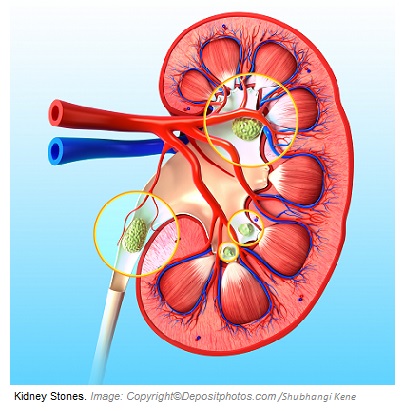 more than women. The medical term for kidney stone is “nephrolithiasis”.
more than women. The medical term for kidney stone is “nephrolithiasis”.
There are four types of kidney stones:
- Calcium oxalate or phosphate, 70 – 75%.
- Struvite (triple phosphate, magnesium-phosphate-ammonium): 15 – 20%.
- Uric acid: 10 -15%.
- Cysteine: 1 – 5%.
Signs and symptoms of kidney stones may vary significantly. If the stones are small, they usually pass through urine by themselves (occult passage). And if they are big, they stuck in the kidneys and do not cause any symptoms. However, a prominent symptom is flank pain that sometimes radiates down to the belly or groin. The pain occurs when the stones start moving and it is sometimes very severe and intolerable. Other signs and symptoms are frequent urination, blood in urine, nausea, vomiting, and infection.
Risk factors:
Calcium Oxalate or Phosphate:
– High level of calcium in urine.
– High level of uric acid in urine.
– High level of oxalate in urine.
– Low level of citrate in urine.
– Dehydration.
– Consumption of too much animal-based proteins.
– Hereditary.
– Sarcoidosis.
– Hyper active thyroid gland.
– Hyper active parathyroid gland.
– Acidic diet.
– High oxalate intake.
– Vitamin D toxicity.
– Magnesium deficiency.
– Obesity.
– Prolonged immobility.
– Very high doses of vitamin C.
– Crohn`s disease.
– Poor absorption.
– Poor fiber diet.
Struvite (Triple Phosphate):
– Increased calcium in urine for any reasons.
– Increased oxalate in urine for any reasons.
– Anomalies of the anatomy of the urinary tract system.
– Kidney or urinary tract infections.
– Gender: females.
Uric Acid:
– Dehydration.
– Gout.
– Increased level of uric acid in urine.
– Chemotherapy.
– Some blood diseases.
– Excess dietary purines.
– Persistently acidic urine.
Cysteine:
– Increased level of cysteine in urine.
Nutritional Supports:
Depending on the type of the stone, nutritional advice varies:
Calcium Oxalate or Phosphate:
Restricted Foods:
- Red meats.
- Vegetables high in oxalate: spinach, rhubarb, beet, okra, collards, celery, eggplants, kale, green beans, potatoes, sweet potatoes, parsnips, green pepper, watercress, and parsley.
- Fruits high in oxalate: berries, figs, kiwi, grapefruit, and concord grapes.
- Legumes.
- Nuts and seeds high in oxalate: almonds, peanuts, Brazil nuts, hazelnuts, pecans, sesame seed, and sunflower seeds.
- High dose of Vitamin C
- Too much salt.
- Alcohol.
- Caffeine.
- Refined sugars.
- Soft drinks.
- Anti-acids containing aluminum.
Recommended Foods:
- Drinking plenty of water: over 3 liters a day.
- Cranberry juice.
- Foods high in magnesium: bananas, avocado, coconut, cashews, corn, barely, brown rice and oats.
Struevite (Triple Phosphate):
Recommendations are the same of those for kidney stones of calcium oxalate or phosphate types.
Uric Acid:
Restricted Foods:
– Beef, Pork, Chicken, Turkey.
– Fish (sardines, herring, mackerel, anchovies).
– Sweetbreads (animal thymus).
– Eggs.
– Beef kidneys.
– Liver.
– Animal brain.
– Scallops, Shrimps, Mussels.
– Meat broths and gravies.
– Beans (legumes).
– Spinach.
– Rhubarb.
– Mushroom.
– Asparagus.
– Cauliflower.
– Beer.
– Alcohol.
– Refined sugars.
Recommended Foods:
– Water: more than 3 liters a day.
– Flaxseed.
– Celery.
– Fish (salmon, cod, halibut).
– Lime.
– Lemon.
– Vinegar.
– Soy protein.
– Dairy products (low fat).
Cysteine:
Restricted Foods:
– Acidic diet.
– Foods high in methionine: soy, dairy products, wheat, fish, lima beans, chick peas, egg whites, and all nuts except hazelnuts.
Recommended Foods:
– Water: more than 3 liters a day.
– Alkaline diet.
Recommended Supplements:
- Magnesium: 200 – 400 mg a day.
- Potassium Citrate: 100 mg a day.
- Vitamin B6: 50 mg a day.
- Inositol Hexaphosphate (IP-6): 120 mg a day.
- Aloe Vera Juice: ¼ cup three times a day.
- Vitamin E: 400 – 800 IU a day.
- Ammonium Chloride (for struvite stones only): 300 – 600 mg a day.
- Cranberry Extract: 400 – 800 mg a day.
- Grape Seed Extract: 50 -100 mg a day.
- French Maritime Pine Bark Extract: 50 – 100 mg a day.

